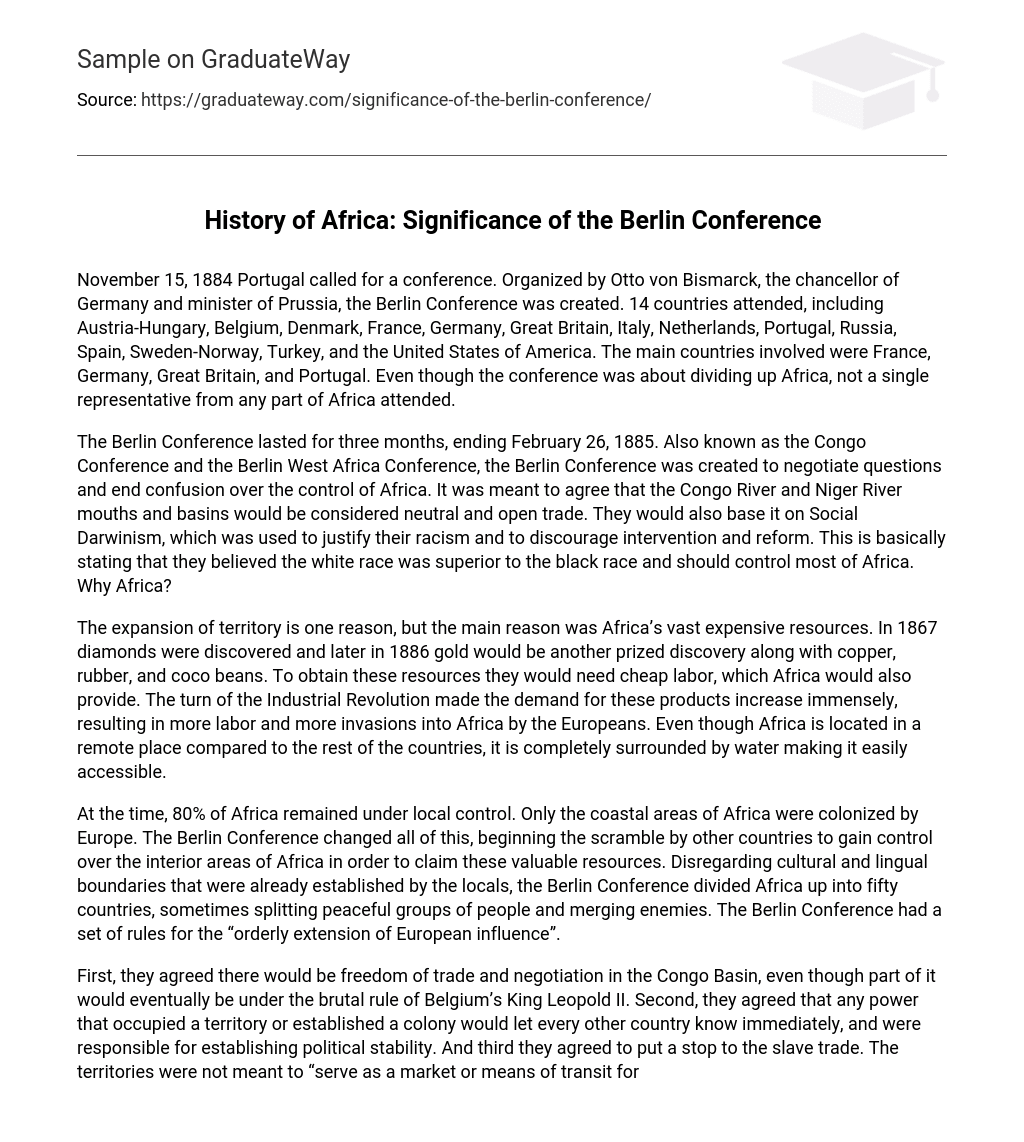The Berlin Conference, initiated by Portugal on November 15, 1884 and organized by Otto von Bismarck – the chancellor of Germany and minister of Prussia – brought together fourteen countries. These nations included Austria-Hungary, Belgium, Denmark, France, Germany, Great Britain, Italy, Netherlands, Portugal, Russia Spain Sweden-Norway Turkey and the United States of America. The main participants were France Germany Great Britain and Portugal. It is important to note that the conference’s objective was to divide Africa among these countries without any African representatives present.
The Berlin Conference, which took place for three months and ended on February 26, 1885, was also referred to as the Congo Conference and the Berlin West Africa Conference. Its main objective was to address confusion and negotiate control over Africa. The conference aimed to establish that the Congo River and Niger River mouths and basins would be considered neutral and open for trade. Additionally, the conference adopted Social Darwinism as a means to justify racism and discourage intervention and reform. Essentially, this ideology promoted the belief in white racial superiority and advocated for white dominance over Africa. The question remains: why Africa?
The main motive for the colonization of Africa was its wealth of valuable resources. In 1867, diamonds were discovered, and later in 1886, gold along with copper, rubber, and cocoa beans were also found. To acquire these resources, cheap labor from Africa was essential. The demand for these products surged due to the Industrial Revolution, leading to more invasions by Europeans and a greater need for African labor. Despite its geographical remoteness compared to other nations, Africa’s accessibility was facilitated by being completely surrounded by water.
At the time, 80% of Africa was under local control, with only the coastal areas being colonized by Europe. However, the Berlin Conference brought about a significant change by sparking a scramble among other countries to gain control over the interior areas of Africa and exploit its valuable resources. Unfortunately, this division was carried out without regard for existing cultural and linguistic boundaries established by the locals. Consequently, Africa was divided into fifty countries, which often resulted in the separation of peaceful communities and the merging of rival groups. The Berlin Conference aimed to establish rules for the systematic expansion of European influence.
First, the parties agreed to guarantee freedom of trade and negotiation in the Congo Basin, notwithstanding Belgium’s King Leopold II’s oppressive rule over a portion of it. Secondly, they mutually agreed that any nation occupying or colonizing a territory should promptly inform all other countries and undertake to establish political stability. Lastly, they concurred to end the slave trade, clarifying that the territories were not intended to facilitate the buying or selling of slaves, regardless of their ethnicity.
Many countries later ignored the rule established at the Berlin Conference, resulting in Europe dominating Africa. As a consequence, Africans lost their rights and ability to lead their own people, and the effects of imperialism are still evident today. Africans were subjected to taxes, a concept completely foreign to them, which forced them to work to meet their obligations. Racism also exacerbated during this time.
The Europeans had to collaborate more closely with the Africans due to their colonization of them. The African culture underwent significant changes, including political transformations, loss of traditional values, language shifts toward European influence, and even alterations in everyday traditions and diet. While the goals of the Berlin Conference encompassed controlling the slave trade, promoting humanitarian ideals, and improving the welfare of Africa, these objectives turned out to be mere empty promises. Although the Europeans did introduce better healthcare and education to Africa, they also imposed several negative aspects on the locals’ way of life.
The sole objective of the European powers was to divide Africa and gain access to its abundant valuable resources. This led to significant changes in Africa and the traditions of its people.





